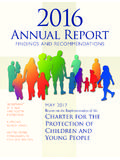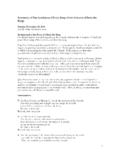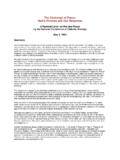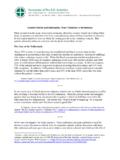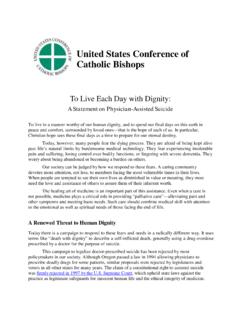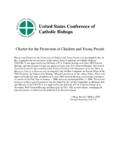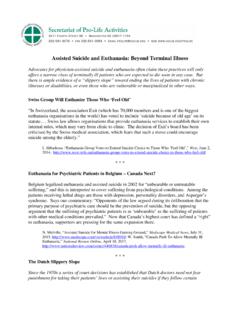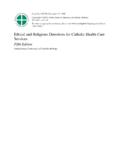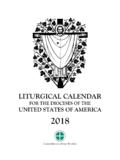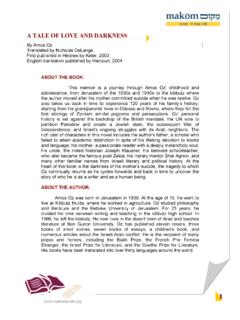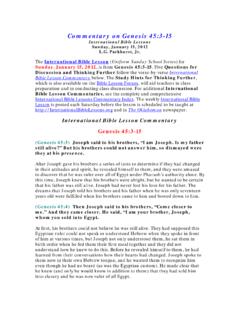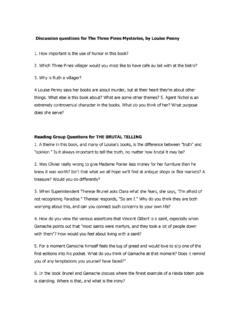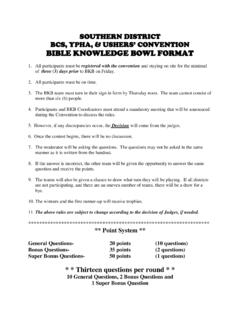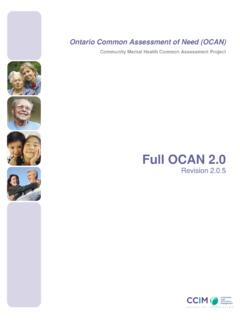Transcription of Lent-Easter Reflections: Cultivating the Gift of Self
1 Lent-Easter reflections : Cultivating the gift of Self By Reverend Robert J. Hater, PhD Professor Emeritus: University of Dayton and Professor of Pastoral and Systematic Theology: Athenaeum of Ohio Introductory Comments The theme for the 2010 Catechetical Sunday materials is Matrimony: Sacrament of Enduring Love. In this light, our Lenten reflections center on Cultivating the gift of self. These reflections are intended for couples of all ages, parents and families, widows, divorced persons, and singles, and they invite us to pray, reflect, discuss, and respond. lent AND easter FIRST WEEK OF lent Let us put ourselves in God s presence. Biblical or Ecclesial Reference You should put away the old self of your former way of life.
2 And put on the new self, created in God s way in righteousness and holiness of truth (Eph 4:22, 24). Topic: Finding Our True Identity in Christ We begin our Lenten reflections by considering our identity. Searching for our identity is part of life. We identify our self as a family member, spouse, sibling, carpenter, farmer, statistician, or clerk. We also identify ourselves as Catholic, or as members of a parish. Identity involves discovering who we are as persons and what our role is by answering these questions: who am I, and why am I here? Growth in the awareness of our Christian identity is a lifelong process that shifts as we change. It is rooted in Baptism, where we are transformed into our true identity as sons and daughters of the Father.
3 St. Paul s Letter to the Ephesians, quoted above, challenges us to put away our former life and put on a new self. In other words, he tells us to turn from sinful ways and take on our new life in Christ. In so doing, we become one with Christ, where we find our true identity. We accept this challenge during lent , as we journey with Christ through life s difficulties to eternal life. Pause to reflect on our true identity in Christ. Reflection Questions The wisdom gleaned from putting on our new identity in Christ that we received at Baptism invites us to ask the following questions: 1. Does my Baptism and ongoing transformation in Christ affect and enrich all my relationships as a spouse, parent, child, sibling, friend, classmate, or co-worker?
4 How? 2. Why is lent a fitting time to reject sinful ways and grow into our new selves, united with Christ? In the silence of our hearts, let us ask if there are sinful patterns to be eradicated from our lives. Let us ask the Holy Spirit to teach us to put on our true self. Second Week of lent Let us put ourselves in God s presence. Biblical or Ecclesial Reference Scripture and the Fathers insist above all on three forms [of interior penance], fasting, prayer, and almsgiving, which express conversion in relation to oneself, to God, and to others (CCC, no. 1434). Topic: Our True Self Related to God, Ourselves, and Others The gospel readings of the First Sunday of lent say that Jesus went into the desert, fasted, and was tempted by the Devil.
5 As we enter lent , a time of fasting, prayer, and almsgiving, those who are preparing for the sacraments at easter , as well as the rest of the initiated faithful, are invited to consider their own temptations in light of Christ s and to reflect on how they have responded to them. Remembering Jesus fidelity to the Father, we ask for grace and the help of the Holy Spirit to reject sin and grow in virtue. Through Jesus life, he showed the importance of fasting. He began his public life by fasting for forty days in the desert (see Lk 4:1-13). Often he went to the synagogue, the desert, or an out-of-the-way place to pray (see Lk 5:16). He told the rich young man that to be perfect he should give away his possessions and follow him (see Mt 19:16-30).
6 Through fasting, we recognize our sinful ways; through prayer, we know God better; and through almsgiving, we respond to our brothers and sisters. Jesus example teaches us that we need to deny ourselves, pray, and give alms. By God s grace, our entire Catholic community can deepen our conversion by putting away sinful ways and taking on our new selves. During lent , we take up our cross and follow Jesus (see Mt 16:24). Just as we need to remove weeds to cultivate plants in our garden, with God s grace, we can grow into the image of Christ. Pause to reflect on the importance of fasting, prayer, and almsgiving to grow in relation to God and our neighbor in Christ. Reflection Questions The wisdom gleaned from fasting, prayer, and almsgiving invites us to ask the following questions: 1.
7 Why are these important in our busy, secular life? 2. Why is lent a good time to practice acts of penance? What are ways to discipline ourselves, pray more, and attend Mass more frequently? 3. How does the Sacrament of Reconciliation help us discover our true identity in Christ? Let us ask Jesus to help us fast, pray, and give alms during lent . Third Week of lent Let us put ourselves in God s presence. Biblical or Ecclesial Reference The Spirit which the Lord pours forth gives a new heart, and renders man and woman capable of loving one another as Christ has loved us (Pope John Paul II, On the Family [Familiaris Consortio] [Washington, DC: USCCB, 1982], no. 13). Topic: Loving Others in Christ When a man and woman marry, they promise lifelong fidelity to each other and become a communion of persons with the capacity for begetting new life.
8 Through the graces of the Sacrament of Matrimony, married couples continue to cultivate their individual identities while establishing their spousal identity in Christ. Spouses cultivate their personal and spousal selves by loving their spouses and any children that God gives them. Parents respond to their God-given vocation when they dedicate time, career, and even life itself to being good examples and providing for the ongoing Christian education of their children. Similarly, single people witness to Christ s self-giving love: for example, when taking care of sick parents. Such a witness is a lesson for single, divorced, or married Christians. Just as Jesus sacrificed for us, so we must do the same for others. When Jesus love for the adulterous woman, the leper, and children becomes our own, we better understand our deepest identity.
9 The middle of lent is a wonderful time to ask the Holy Spirit to help us reflect Jesus love. If it has weakened, we are invited to refocus our priorities. Pause to reflect on loving others in Christ. Reflection Questions The wisdom learned from observing the selfless love of parents invites us to ask the following questions: 1. What married couple, widow, single person, or divorced person is an example of Jesus selfless love for you? Please describe how. 2. What inspirational biblical stories serve as examples of selfless love? How do these stories help you cultivate your gift of self? Let us pray to Mary, the Mother of God, asking her to ask Jesus, her Son, to help us imitate his selfless love. Fourth Week of lent Let us put ourselves in God s presence.
10 Biblical or Ecclesial Reference The family has the mission to guard, reveal and communicate love, and this is a living reflection of and a real sharing in God s love for humanity and the love of Christ the Lord for the Church His bride (Familiaris Consortio, no. 17). Topic: Communication in Christ God the Father shares his love for his children through the love of their parents. This points to parents awesome responsibility to prioritize what is important. Their model is the Holy Family, where Mary and Joseph sacrificed for Jesus. After the Resurrection, Jesus commissioned his followers to communicate God s love to all people. Sharing God s love is a precious treasure given to every Christian at Baptism. It is not to be hidden; it is rather to be communicated in families, schools, parishes, workplaces, neighborhoods, and wherever people assemble.
